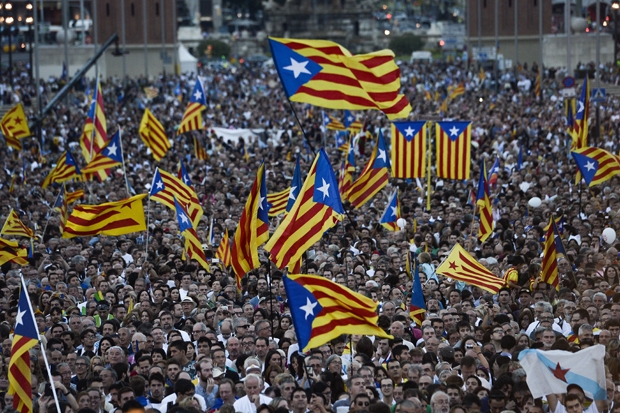One of the unforeseen consequences of the reunification of Europe after the Cold War has been a resurgence of independence movements in western Europe. Emboldened by a greater sense of security and influenced by the rebirth of independent nations to the east, separatist parties have begun to challenge the boundaries of nation states which a quarter of a century ago we took for granted.
Scotland’s near miss — a 45 per cent vote for ‘yes’ — inspired the leader of Spain’s Catalonia region, Artur Mas, to launch his own vote on secession. This week, forbidden by Madrid from calling a referendum, he called regional elections in which pro-independence parties formed a bloc: effectively a test, they claimed, of voters’ desire for independence. There was a majority of seats in the regional parliament, but a minority of the votes, leaving Snr Mas with a pyrrhic victory.
Catalonian separatists are unable to command genuine majority support because, as in Scotland, a majority can see that independence from a three centuries-old nation state carries more risks than possible benefits. Simple transactions would become imports and exports. Why make foreigners out of friends and relatives? Then comes the issue of EU membership for Catalonia, which — as with Scotland — is by no means assured and may very well result in Catalans sending to Brussels some of the money they hoped to save in transfers to Madrid.
But Madrid ought to allow Catalans to reach this conclusion without trying to bully them into it. If David Cameron was too laid-back about the Scottish referendum and failed to make the case for the Union until it was nearly too late, the government of Mariano Rajoy has taken the opposite approach. He has threatened to impose direct rule from Madrid and dissolve Mas’s regional government of Catalonia. Over the years, the Spanish government has issued constant reminders that secession is illegal under the Spanish constitution. So it is, but that does not mean that constitutions cannot be changed by parliamentary vote.
Such a tin-eared approach is not going to win the argument. On the contrary, it will merely stir passions, and send moderate voters towards the separatists, to protest against what they see as centralist arrogance. As with all separatist movements, the arguments for Catalan independence collapse when you begin to appreciate that Catalonia itself is hardly a homogenous entity. It is made up of four provinces, dominated by Barcelona. All nation states are the result of historic accidents, ancient wars or intermarriage of royal families. Yes, Catalonia and Scotland were independent in the 16th century. But Europe was then divided into about 500 polities. Should they all be restored too?
It is dangerous for any national government to dismiss the separatists’ case as absurd or criminal. As the forces of globalisation continue to tear down boundaries, it becomes easier for separatists to say that the logic for large nation states has vanished. We are in a new era now. The case for national unity has to be made with passion, clarity and logic. Britain almost fell apart last year, after our government struggled to make a compelling case for unity. Spain should learn from our mistakes.
Corbyn’s crib
Nobody expects politicians to write their own speeches. But it was extremely odd of Jeremy Corbyn to crib large chunks of his first major conference address from a speech that had been sent to — and rejected by — every Labour leader from Neil Kinnock onwards. Corbyn promised to bring in a new kind of politics. Yet in his speech on Tuesday, he lifted several passages directly from a text that had been freely available on a speechwriter’s website for years. That’s a trick that would disgrace a GCSE student, let alone a man who wants to be prime minister.
Corbyn’s team are not used to the level of scrutiny they now face. They probably didn’t think his crib would be exposed within minutes of the speech being given — which it was, thanks to the brilliance of TheSpectator’s writer Alex Massie who broke the story on our Coffee House blog. It was then followed by the national media.






Comments